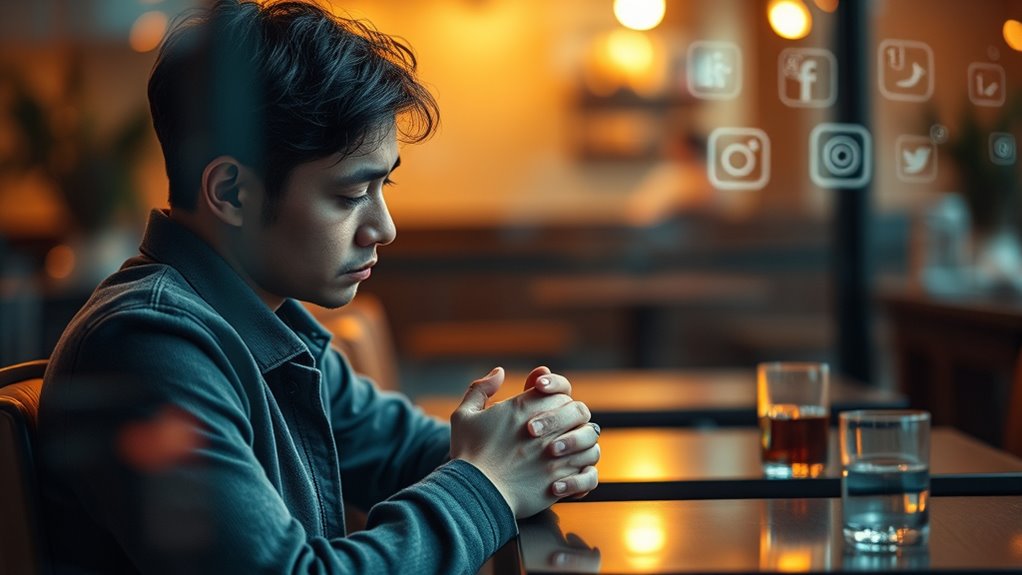When influencers apologize for cheating, they tend to sway fans because those apologies focus on emotional needs and authenticity. Fans see these messages as sincere, especially when they admit fault and show remorse, which helps rebuild trust with their audience. However, partners usually view scripted or strategic apologies as superficial and insincere, because they expect accountability and real change. Understanding these differences can help you see how plans can backfire, and there’s more to uncover about what really matters.
Key Takeaways
- Fans value authenticity and emotional vulnerability, perceiving sincere apologies as genuine, fostering forgiveness.
- Partners seek tangible accountability and behavioral change, viewing scripted or superficial apologies as insincere.
- Influencers craft apologies aimed at maintaining public image, appealing to fans’ emotional investments and loyalty.
- Fans interpret apologies as signs of remorse and growth, while partners often see them as manipulative or insincere.
- Emotional stakes are higher for partners, making superficial apologies less effective in rebuilding trust compared to fans.

When influencers face accusations of cheating, their public apologies can substantially impact their careers and reputation. You may see them issue heartfelt messages, often filled with remorse and promises to do better. These apologies are designed to salvage their image, keep their followers engaged, and prevent losing sponsorships or brand deals. But what makes these apologies resonate so strongly with fans, yet often fail to convince partners? It comes down to the different expectations and emotional investments involved.
Fans look up to influencers as role models or entertainment figures. They want to believe in the authenticity of the influencer’s words, especially when the apology is sincere. When you see an influencer admit fault, express regret, and promise change, it taps into your desire for honesty and redemption. Fans tend to forgive because they want to see the person they admire grow, and they’re often more forgiving of mistakes when they perceive genuine remorse. Additionally, fans usually don’t have the same emotional stake as partners; they’re more emotionally distant, which makes it easier to accept apologies at face value. Their support is often rooted in a sense of loyalty or entertainment, rather than shared life commitments.
Fans see influencers as role models and forgive mistakes when sincerity and remorse are evident.
On the other hand, partners are emotionally invested in a much deeper, more personal way. When cheating occurs in a romantic relationship, the betrayal cuts much deeper than a public scandal. An apology may be seen as insufficient or insincere because the partner’s emotional pain runs far beyond surface-level forgiveness. They expect accountability, transparency, and tangible changes, not just words. While a fan might forgive a celebrity’s misstep, a partner’s trust is harder to rebuild. For partners, actions matter more than words, and a public apology might feel like a performative gesture rather than genuine remorse. They’re less swayed by scripted messages and more focused on consistent behavior that demonstrates real change.
Furthermore, influencers tend to craft their apologies with their audience in mind. They often hire PR teams or follow common formats that appeal to fans’ sentiments. This strategic approach increases the likelihood that fans will forgive and continue their support. For partners, however, the stakes are personal and immediate. An influencer’s carefully crafted apology can come across as insincere or manipulative, especially if not backed by consistent actions. While fans might see an apology as a sign of vulnerability and growth, partners often interpret it as a superficial attempt to save face, which can deepen feelings of betrayal rather than mend them. In essence, the emotional distance and different expectations between fans and partners explain why influencer apologies tend to work better on fans but often fall flat with partners.
Additionally, the rise of AI security technology in digital communication means that many apologies are now crafted with strategic precision, aiming to maximize positive reception from fans while minimizing backlash from the public.
Frequently Asked Questions
How Do Fans Typically Respond to Influencer Apologies?
Fans usually respond to influencer apologies with forgiveness, support, or understanding, especially if they’re loyal followers. You might see them offering words of encouragement or accepting the apology quickly. However, some fans may remain skeptical or disappointed, especially if they feel betrayed. Your response depends on how genuine the apology seems and your personal connection to the influencer. It’s natural to have mixed feelings, but many choose to forgive and move on.
What Emotional Factors Influence Fans’ Forgiveness?
You’re influenced by emotional factors like empathy, hope, and loyalty when deciding whether to forgive. If you feel compassion for the influencer or believe they’re genuinely remorseful, you’re more likely to forgive. Your hope for redemption and desire to see the best in them also play a role. Loyalty to the influencer can make you overlook mistakes, but if trust is broken, forgiveness becomes harder.
Why Do Partners Often Remain Unforgiving After Cheating?
You might wonder why partners stay unforgiving after cheating. It’s because trust, once broken, feels irreparable, like shattered glass beneath your feet. Your partner perceives the betrayal as a deep wound, not just a mistake. They question your sincerity, fearing history could repeat itself. Emotions run high, and the pain lingers, making forgiveness feel impossible. The emotional scars cut deeper than a simple apology can mend.
Can Public Apologies Rebuild Trust in Relationships?
Public apologies can help rebuild trust if they’re genuine, transparent, and accompanied by consistent actions. You need to show accountability and patience, demonstrating that you’re committed to change. However, simply issuing an apology isn’t enough; your actions over time will determine whether trust is restored. If your partner sees sincerity and effort, they may gradually open up again, but it’s a process that requires ongoing dedication.
Do Cultural Differences Affect Apology Effectiveness?
Yes, cultural differences definitely impact apology effectiveness. You might find that in some cultures, direct and public apologies are appreciated, while others favor private, humble regret. If you’re aware of these norms, you can tailor your apology to resonate better. By respecting cultural expectations, you show genuine remorse, making your apology more meaningful and increasing the chances of rebuilding trust, whether with fans or a partner.
Conclusion
Just like Icarus flying too close to the sun, your fans might forgive your slip-ups, captivated by the shine you project. But in the domain of true partnership, honesty acts as the steady wings that keep you grounded. When you cheat, it’s as if you’re risking both the sky and the trust you’ve built. Remember, genuine connections aren’t just about dazzling appearances—they’re about the honesty that keeps us soaring higher together.









